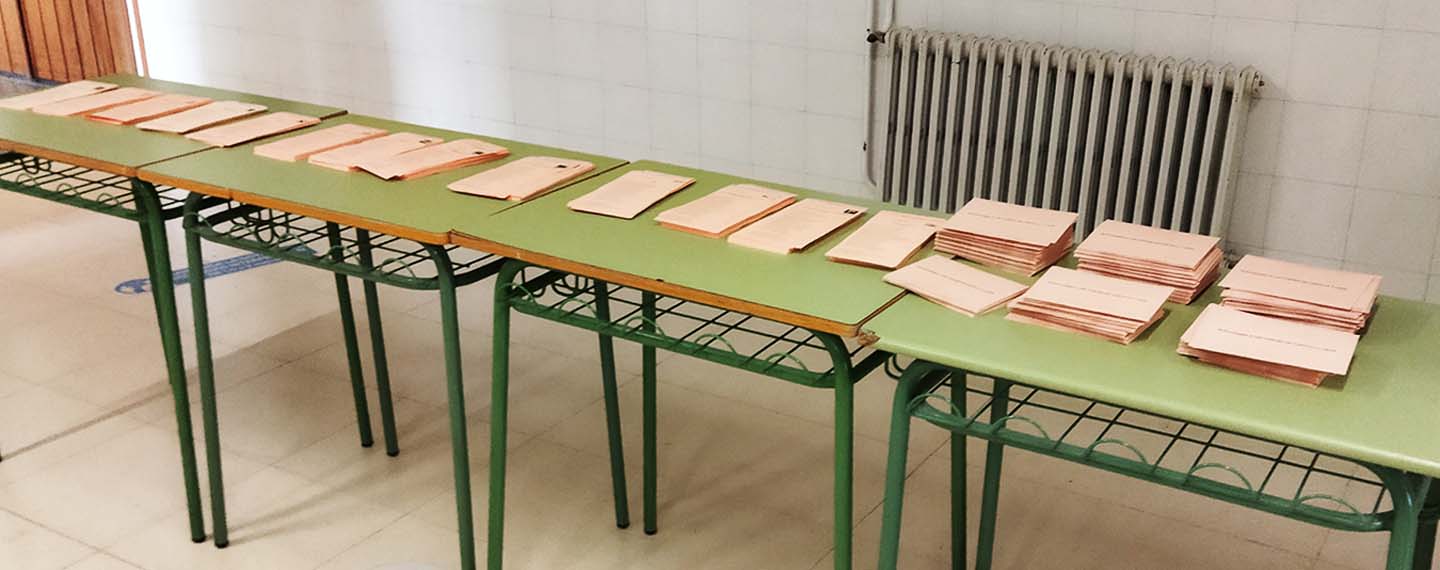In an ugly climate of polarisation and confrontation, Spain goes to the polls in May to elect more than 8,000 local councillors and 12 regional governments, and a new government by the end of the year.
Municipal and regional elections in May and a general election probably in December make 2023 a very political year, and they will be contested in an ugly climate of polarisation and confrontation.
The Socialists have been in power in a minority since June 2018 after winning a no-confidence motion against the conservative Popular Party (PP) government of Mariano Rajoy over a corruption issue, with the support of separatist and hard-left parties, and then winning the general election in November 2019 and forming Spain’s first coalition government since the 1930s, with Unidas Podemos (UP), and again in a minority.
An indication of whether the Socialists will continue to rule will come in May’s local elections when 8,131 municipalities and the governments of 12 of the country’s 17 regions are up for grabs. In 2019’s municipal elections, the Socialists obtained 6.65 million votes and 22,329 councillors, the PP 5.05 million votes and 20,325 councillors, the would-be centrist Ciudadanos (Cs) 1.87 million votes and 2,788 councillors and the hard-right VOX 659, 736 votes and 530 councillors.
The five regions not holding elections are Catalonia, where pro-independence parties won another victory in 2021; Andalucia, where the PP won an absolute majority in the Socialists’ former fiefdom and also held on to Castile-León; and Galicia and the Basque Country whose elections are not due until 2024, unless called early. Of the 12 elections, the most important politically are those in Madrid, a PP fiefdom since 1995 at the regional level and since 1987 in the Town Hall.
Isabel Díaz Ayuso, the combative Premier of Madrid, called a snap election in 2021 and won a resounding victory but the region still has to hold an election in May. The PP more than doubled the party’s seats to 65 in the 136-strong Assembly, a higher number than the three left-wing parties combined. Her victory was four seats short of an absolute majority. She governs with the support of VOX. Cs lost all the 26 seats it had won in the 2019 election. The PP even conquered the ‘red belt’ districts in the south of Madrid.
May’s elections will be decisive for the continuation of Cs, which has failed to forge itself in its 17-year existence as a centrist party and looks as if it is on the verge of extinction, and also for the consolidation of VOX, founded in 2013, as a permanent presence to the right of the PP. The latest poll on a general election, which some analysts say will be held on 10 December at the end of Spain’s six-month presidency of the EU, shows VOX losing seats (to the PP) in the national parliament and Cs disappearing (see Figure 1).
Figure 1. Projected seats by parties in parliament in 2023 general election and those won in 2019
| 2023 | 2019 | |
|---|---|---|
| Popular Party | 122 | 89 |
| Socialists | 109 | 120 |
| VOX | 41 | 52 |
| Unidas Podemos | 31 | 35 |
| Republican Left of Catalonia | 13 | 13 |
| Together for Catalonia (JpCat) | 9 | 8 |
| Basque Nationalist Party | 6 | 6 |
| EH Bildu | 5 | 5 |
| Más País | 4 | 3 |
| Others | 10 | 19 |
| Total | 350 | 350 |
According to the poll by 40dB published this month, the PP would win 122 seats, 33 more than in 2019, and the Socialists 109, 11 fewer. Neither party would be anywhere near a position to govern alone (176 seats gives an absolute majority), as is the case for the Socialists today.
On the basis of that poll, VOX’s 41 seats, down from 52 in 2019, would still leave the PP 13 short of an absolute majority and with difficulties to find further support. The six seats of the Basque Nationalist Party (PNV), which has supported both PP and Socialist governments in the past, would not help as the PNV would not support the PP if VOX helped it to power.
The Socialists face a similar problem: its projected 109 seats plus the 31 of UP, the 18 of the separatist parties, Republican Left of Catalonia (ERC) and EH Bildu, which support the current government, and the four of Más País, would still leave it 14 short of an absolute majority.
The days of absolute majorities in Spain ended in December 2015 when the two-party mould of Spanish politics was broken (see Figure 2). In that election, the PP won 123 of the 350 seats, its lowest number since 1989, the Socialists 90, their worst performance, and the new arrivals, Podemos and Cs, 42 and 40 respectively (VOX entered parliament in 2019). These results produced a deadlocked parliament and fresh elections were held in June 2016. The PP won again but its 137 seats were still far from an absolute majority and the Socialists’ result was worse than in 2015.
The combined votes of the Socialists and the PP in general elections between 1982 and 2019 dropped from a high of 84% of the total cast in 2008 to 48.8% in 2019 (see Figure 2).
Figure 2. The rise and fall of the Socialists and the Popular Party, 1982-2016 (% of votes in general elections)
| 1982 | 1986 | 1989 (1) | 1993 | 1996 | 2000 | 2004 | 2008 | 2011 | 2015 | 2016 | 2019 | |
|---|---|---|---|---|---|---|---|---|---|---|---|---|
| PSOE | 48.1 | 44.1 | 39.6 | 38.8 | 37.6 | 34.2 | 42.6 | 43.9 | 28.8 | 22.0 | 22.6 | 28.0 |
| PP | 26.4 | 26.0 | 25.8 | 34.8 | 38.8 | 44.5 | 37.7 | 39.9 | 44.6 | 28.7 | 33.0 | 20.8 |
| Total | 74.5 | 70.1 | 65.4 | 73.6 | 76.4 | 78.7 | 80.3 | 83.8 | 73.4 | 50.7 | 55.6 | 48.8 |
Source: Interior Ministry.
The Socialists’ best chance of continuing in power would seem to rest on UP (and its regional allies) and other parties to the left of the Socialists joining forces under Sumar, a platform started by Yolanda Díaz, the Labour Minister and the Second Deputy Prime Minister in the current government, instead of running separately. Sumar, however, has yet to register as a party let alone decide who would lead it, and it is not running in May’s elections.
A poll by 40dB published last month gave Sumar 57 seats in parliament if it succeeded in uniting all parties to the Socialists’ left as opposed to 23 seats if it and similar parties ran on their own. UP would win seven. Sumar’s 57 seats, the Socialists’ 96 in this scenario and the parliamentary support of the same parties that back the current government would just about get the Socialists over the line.
A unified Sumar would take votes from the Socialists and would give it more power than UP has in the current and fractious coalition. Díaz (51), a labour lawyer and former communist militant, has an uneasy relation of rivalry with Irene Montero (34), the Equality Minister in the current government and the partner of Pablo Iglesias, one of the UP’s founders and the Second Deputy Prime Minister until he quit in 2021. Díaz replaced him as the Second Deputy Prime Minister. Iglesias negotiated the coalition pact with Prime Minister Pedro Sánchez and continues to pull the strings.
A failure to unite behind Sumar, according to the poll, would probably enable the PP, under its new leader Alberto Núñez Feijóo, who replaced Pablo Casado last April over a spying scandal, to form a government with VOX and the support of small parties.
While the outcome of a general election is uncertain, and a lot can happen after the results of May’s elections, there is no doubt about the vitriolic turn that politics has taken, even though Spain is far from being alone in this curse. Parliamentary debates offer little more than the lamentable spectacle of a slanging match. The lack of agreement on even basic issues of state is epitomised by the four-year partisan stalemate over new appointments to the General Council of the Judiciary (CGPJ), which is responsible for appointing judges and ensuring the judiciary’s independence.
The CGPJ’s mandate expired in December 2018 and since then it has been operating on an interim basis, causing increasing problems in the functioning of the court system, because the Socialists and the PP cannot agree on its new makeup. The CGPJ has 20 members –12 judges or magistrates and eight lawyers or other jurists– who must be elected by a three-fifths majority in parliament. Pleas by EU Justice Commissioner Didier Reynders, worried by more serious risks to the rule of law in Hungary and Poland, to resolve the issue have come to nothing.
Spain ranks a dismal 22nd out of the EU’s 27 countries in public perception of judicial independence. Last year the democracy index published by the Economist Intelligence Unit (EIU) downgraded Spain from a ‘full democracy’ to a ‘flawed democracy’, largely because of political divisions over the appointment of new members to the CGPJ (see Figure 3). The country is most unlikely to be restored to its previous noteworthy position in the next index, due to be published in February.
Figure 3. Democracy Index 2021
| Rank out of 167 countries | Overall score out of 10 |
|---|---|
| 1. Norway | 9.75 |
| 6. Denmark | 9.09 |
| 11. Netherlands | 8.88 |
| 15. Germany | 8.67 |
| 18. UK | 8.10 |
| 20= Costa Rica | 8.07 |
| Flawed democracy | |
| 22. France | 7.99 |
| 24. Spain | 7.94 |
| 31. Italy | 7.68 |
At the heart of the stand-off is the PP’s fury at what it views as the government’s pandering to the Catalan secessionists in order to keep itself in power (the ERC’s 13 parliamentary votes are crucial). Parliament reformed the archaic law of sedition (almost unchanged since 1822) that was used to sentence nine separatist leaders for nine to 13 years in prison in 2019 after they were found guilty of sedition and misuse of public funds for organising the illegal 2017 referendum. They were partially pardoned in 2021. The new offence of ‘aggravated public disorder’ carries a maximum sentence of five instead of 15 years. As a result of this reform, the Supreme Court dropped sedition charges against former Catalan Premier Carles Puigdemont, who has been in self-imposed exile in Belgium for the past five years. Sanctions for misuse of public funds were also reduced, but only when the money involved had not been misappropriated for personal gain.
Prime Minister Pedro Sánchez believes he has done enough to take the heat out of the Catalan independence issue, which erupted when the PP was in power, and sees no reason for the Mesa de Diálogo to continue to meet. Support for independence has waned. Père Aragonès, the ERC leader and current Premier of Catalonia, appears to have ruled out seeking independence unilaterally, to the anger of Together for Catalonia, the other pro-independence party, but still has his sights on a referendum agreed with Madrid.
The best outcome for the health of Spain’s political life from the general election would be a German style left-right coalition between the Socialists and the PP, but the chances of that happening are slim to put it mildly.
Image: Elections to the Cortes of Castilla y León in 2022. Photo: MiguelAlanCS (CC BY-SA 4.0 / Wikimedia Commons).



